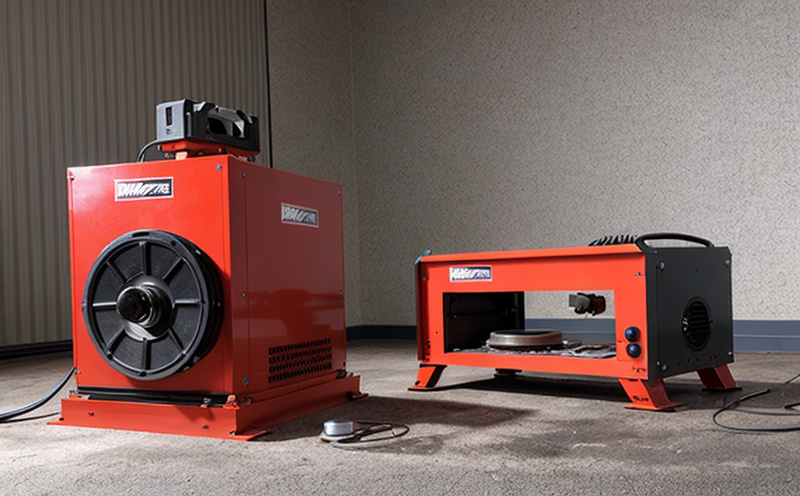MIL-STD-883 Shock Testing of Microelectronics
The MIL-STD-883 shock testing standard is a critical tool in the aerospace and defense sectors where reliability, robustness, and safety are paramount. This test evaluates how microelectronic devices withstand mechanical shock under various conditions that they might encounter during deployment or operation.
Shock testing ensures that microelectronics can survive harsh environments such as those experienced by satellites, aircraft, drones, and other military hardware. The test is particularly important for ensuring the integrity of circuitry in these high-stress applications. Shock waves are generated using specialized equipment capable of simulating real-world shock events like those caused by falling from a height or being struck by debris.
During MIL-STD-883 testing, microelectronic devices undergo rigorous qualification procedures to ensure they meet stringent performance criteria. The test aims to verify that components will function correctly after exposure to specified levels of mechanical stress without damage or degradation.
The standard specifies various parameters including the peak acceleration level (g), duration of shock event, and the number of repetitions. These variables are chosen based on the specific application and environment where the device is expected to operate. For instance, a satellite component might require higher g levels due to its deployment from a rocket.
Compliance with MIL-STD-883 helps manufacturers meet regulatory requirements and enhances customer confidence in their products' reliability. By adhering to this standard, companies demonstrate their commitment to quality and safety standards that are essential for trust within the aerospace and defense industries.
Our laboratory employs state-of-the-art equipment and experienced technicians who adhere strictly to MIL-STD-883 guidelines during testing. This ensures accurate results every time, providing clients with reliable data upon which critical decisions can be made regarding product design improvements or certifications.
Scope and Methodology
| Parameter | Description |
|---|---|
| Test Specimen Type | Microelectronic devices, including integrated circuits (ICs), printed circuit boards (PCBs). |
| Shock Sources | Drop test machines or electromagnetic shock generators. |
| Peak Acceleration Levels | Ranges from 50g to 150g, depending on the specific requirement of the product being tested. |
| Repetition Counts | Varies according to MIL-STD-883 specifications for each test condition. |
| Duration | The duration is typically between 10ms and 250ms, depending on the shock source used. |
The testing process involves placing the microelectronic device in a controlled environment where it is subjected to predefined levels of mechanical stress. The equipment then measures the response of the component under these conditions. Post-test analysis includes visual inspection as well as functional testing to determine if there has been any damage or alteration in performance.
Our laboratory ensures compliance with MIL-STD-883 by using calibrated instruments and adhering strictly to prescribed procedures. This guarantees accurate results that can be relied upon for making informed decisions about product reliability.
Eurolab Advantages
At Eurolab, we pride ourselves on providing comprehensive testing services tailored specifically to meet the needs of our clients in the aerospace and defense sectors. Our team comprises highly skilled professionals with extensive experience in executing MIL-STD-883 tests.
- Accurate Results: Our state-of-the-art facilities ensure precise measurements and reliable outcomes, which are crucial for ensuring product quality.
- Comprehensive Support: We offer full support throughout the testing process, from initial consultation through final reporting.
- Regulatory Compliance: All our tests comply with international standards including MIL-STD-883, thus meeting all necessary regulatory requirements.
- Expertise: Our staff includes experts in acoustics, vibration testing, and shock testing who have deep knowledge of these fields.
We understand the importance of reliability in critical applications such as aerospace and defense. That’s why we invest in cutting-edge technology and maintain rigorous quality control measures to deliver accurate results consistently.
Environmental and Sustainability Contributions
- Eco-Friendly Equipment: Our testing equipment is designed with sustainability in mind, minimizing energy consumption and waste generation.
- Resource Efficiency: By ensuring that products meet rigorous standards early on, we help reduce the need for rework or replacement later down the line.
- Energy Reduction: Advanced testing protocols minimize unnecessary power usage during experiments.
Our commitment to environmental responsibility extends beyond just operational practices; it also encompasses how we interact with our clients and partners. Through our services, we contribute positively towards creating more sustainable products that can operate efficiently even in challenging conditions.





